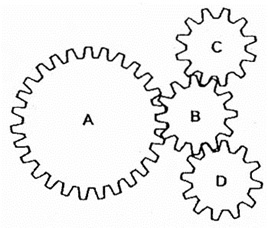Ramsey Aptitude Test Study Guide
This measures your knowledge of straightforward physical and mechanical concepts. Your score will depend significantly on your knowledge of:. Shop Arithmetic If you are taking a mechanical aptitude test as part of the selection process for the emergency services or the military then the questions you can expect will tend to concentrate on principles rather than on making calculations. For example, you may be shown several diagrams of a lever and asked which one is the most efficient.

If however, you are taking a test for a technical job then you may be expected to calculate the actual force required to move a particular lever. In this case, knowing the principle is not enough, you need to know the formula. Free Mechanical Aptitude Test Questions 1) How much weight is required to balance the lever? A B C D E 7.25 6.25 9.25 5.50 8.50 Many of the questions in mechanical comprehension tests are ‘industry’ specific. For example, tests used by the fire service tend to frame the questions in terms of fire-fighting whereas tests used to select for an aircraft maintenance job would tend to frame the questions in aviation industry terms. It doesn’t matter if the questions you practice on aren’t specific to the industry you are applying for.

It is the substance of the question that is important – the scenario is incidental. These sample question papers each contain 40 questions and have a suggested time limit of 30 minutes each.
The questions are presented in Letter/A4 format for easy printing and self-marking. Download You may also be interested in: and.
Ramsey Mechanical Aptitude Test Study Guide
Thanks wayne.what should i concentrate on most.i know electrical stuff but i'm not sure what to concentrate on.i appreciate it alot.thank youYou should know what your weak in, these books have practice question at the end of each section and chapter, I would look at theses and see how many you know, as you find each area your having problems with knowing the answers then you know you need to study that section or chapter. In no way can I know what your weak in? As for knowing what is in the test, each industry will have Ramsay design the test to fit the need of that industry, no two test from different company's will be the same, so while I was hit with mostly electronic, motor control, motor wiring of different types of motors, DC cranes and Instrumentation, the place you apply to might want other things, maybe more toward the electrical area, and code, The best thing to do is study in the areas you are weak in.
Hurk's right. I just helped put together the Ramsey Test for Maint. Elec and Mech. About a year ago.
We had people from all of our locations (maint Mgrs, EEs, etc) around a table. The potential test questions were given to us. We did a round robin answering the questions and then each rated that question on its improtance to the craft. Took a full day.
Talk about being put on the spot when it came your turn. I had one guy ask me how I knew the answer to a particular question. All I could say was, I guessed. You had to be there, but it got a laugh. If you are going to work for the plant that is at the top of Cline Ave, good luck!
I did my electrical apprenticeship there '75-'77. The training they provided has served me well ever since. Cutler-Hammer had a very good DC Crane Control Handbook that went through control wiring and power wiring for cranes.
I worked primarily at #3 Open Hearth. I think it's been closed down now.
Ramsay Multicraft Aptitude Test Study Guide
Basic Oxygen Furnace (BOF), Continuous Caster are good places to work. Best advice is keep your head on a swivel. You won't be able to hear anything coming at you most of the time, you have to time it and sense it.
Top Articles
- ✔ Mailcrafter Manual
- ✔ 800 Can Am Outlander Service Manual
- ✔ Answer Key Arriba Student Activities Manual
- ✔ Kawasaki 650 Sx 1988 Manual
- ✔ Jcb 532 Manual
- ✔ Burger King Manager Guide
- ✔ Stihl Fs 83 Parts Manual
- ✔ Rainbird Systems Manual Ez 1
- ✔ Chfm Certification Study Guide Doc Up Com
- ✔ Manual Transmission Fluid For Nissan Versa Sensor
- ✔ Ingersoll Rand Air Compressor 4000 Service Manual
- ✔ Service Manual Yamaha Outboard 15hp 4 Stroke
- ✔ Workshop Manual Service Front Page
- ✔ 1972 Yale Forklift Manuals
- ✔ Canada 2013 Volkswagen Touareg Owners Manual